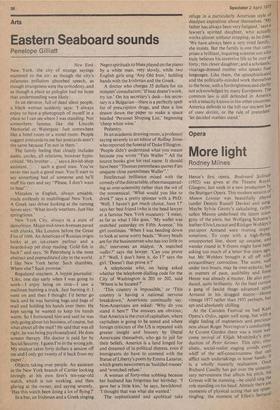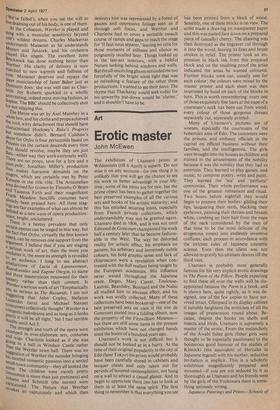Opera
More light
Rodney Milnes
Henze's first opera, Boulevard Solitude (1952) was given at the Theatre Royal, Glasgow, last week in a new production by the Stuttgart Opera. This modern version of Manon Lescaut was beautifully played (under Dennis Russell Davies) and sung. Maybe Sylvia Geszty's calculating, rather sullen Manon underlined the latent misogyny of the piece, but Wolfgang Schoene s leather-Elvis Lescaut and Rüdiger Wohlers's put-upon Armand were riveting imPersonations. To cope with a high-flYing; unsupported line, shoot up cocaine, and wander round in Y-fronts might have been asking too much of a tenor five years ago, but Mr Wohlers brought it all off with extraordinary conviction. The score, well under two hours, may be over-eclectic, but in matters of pace, audibility and form Henze was already a master. He also Produced, quite brilliantly. At the final curtain a gang of fascist thugs advanced upon Armand in his drugged stupor—Henze vintage 1977 rather than 1952 perhaps, but apt and absolutely chilling. At the Camden Festival we had Kent Opera's Orfeo, again well sung, but with a slight feeling of mannerism and preciousness about Roger Norrington's conducting. At Covent Garden there was a most welcome revival of Elijah Moshinsky's production of Peter Grimes. This epic, ritualistic, social-realist staging avoids everY whiff of the self-consciousness that can afflict such undertakings in lesser hands: it is a wholly masterly realisation. Once Richard Cassilly has got over the unnecessary nervousness that affects his pitch, his Grimes will be stunning—he could sing the role standing on his head. Already there.are moments of physical acting that are spine': tingling: the moment of Ellen's betrayal
('We've failed'), when you see the will to live draining out of his body, is one of them.
At the Coliseum, Werther is played and sting with a muscular sensitivity beyond One's wildest dreams. Charles Mackerras understands Massenet as he understands 4, nzart and Janacek, and his orchestra 1)1aVed like angels. The excellent John arecknock has done nothing better than Werther. His clarity of delivery is now Matched to new warmth and fullness of tone. Massenet deserves and repays the s_neer musicianship of Janet Baker just as uonizetti does: she was well cast as Charlotte, Joy Roberts sparkled in a wholly unirritating, indeed most moving fashion, as Sophie. The BBC should be collectively shot for not relaying this. The Henze was set by Axel Manthey in a White box, and his cloths and props achieved the cool, witty detachment that should have characterised Hockney's Rake's Progress but somehow didn't. Bernard Culshaw's decor for Orfeo is four periactoids based on ri_°ussio (as the curtain descends every time .'"ey should revolve, maybe they are just ats--either way they work extremely well). There are no props, save for a lyre and a Punt-Pole; Jonathan Miller's production thus makes fearsome demands on the singers, which are certainly met by Peter KanaPP in the title rOle. The Aristotelian area devised for Grimes by Timothy O'Brien arnct Tazeena Firth and their magnificent !rank Meadow Sutcliffe costumes have ireadY been praised here. All three stag1gs are fair examples of what can almost be defined as a new wave of opera production : spare bright, uncluttered. There is a heresy prevalent that only certain operas can be staged in this way, but the fact that Orfeo, virtually the first known "era, can be removes one support from the argument. I believe that if you are staging a serious work of art, then the more you unclutter it, the more its strength is revealed to an audience. I long to see abstract 13,,roductions of Lucia di Lammermoor, ."senkavalier and Eugene Onegin, to name lust three masterpieces renowned for their scenery rather than their content. Is ;verther a serious work of art ? Emphatically „es, as serious as The Bassarids. I am not 1-1gge551ng that John Copley, Stefanos (Costumes) (sets) and Michael Stennet ‘, nstomes) collectively thought We is a romantic melodrama and as long as it Looks Pretty it
dour, will be all right,' but I had terrible uts until Act 3.
The strength and truth of the opera were swamped amPed in over-elaborate sets, costumes _I-1!3 Wigs. Charlotte looked as if she was l:1:41.1g to a ball in Windsor Castle rather than an the Wetzlar town hall. There was no s ku,SSestion of Werther the outsider bringing 'sus morbid romantic passions into a settled sTall-town community—they all looked the fle. The children were merely pretty (i jo",nocence is more than just prettiness) and c, nano and Schmidt (the norms) were :aricatured. The Nature that Werther mvokes so rapturously and which then
destroys him was represented by a forest of gauzes and oppressive foliage seen as if through soft focus, and Werther and Charlotte had to cover a veritable assault course of ramps and gaps to reach the stage for 'II faut nous separer,' leaving no time for those moments of stillness and silence so poignantly recalled later. Things looked up in the last-act interiors, with a baleful Nature lurking behind windows and walls. But the all-encircling gloom reminded me too forcefully of the bright white light that was so refreshing a feature of the other three productions : I wanted to see their faces. The rhyme that Thackeray would seek today for his unworthy put-down would be 'clutter,' and it shouldn't have to be.







































 Previous page
Previous page